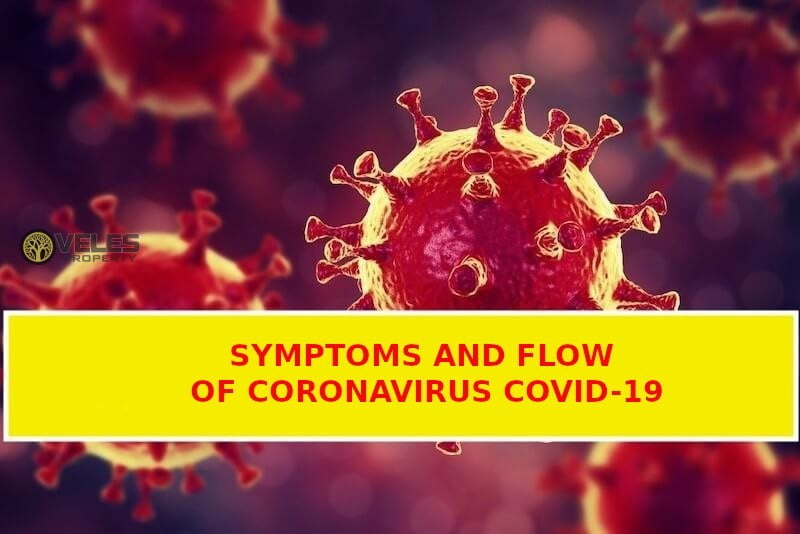Symptoms and flow of the coronavirus Covid-19. Updated data as of 27/03/2020
The spread of coronavirus infection in Northern Cyprus is gaining momentum. List of infected has been replenished by residents of Karpas. Entire area was quarantined. One of the families who came into contact with the infected coronavirus and are in home quarantine left their home. The whole family went to their relatives living in Chatalkoy.
Through the efforts of the Chatalkoy municipality, the perpetrators were arrested and sent back to their homes for compulsory quarantine. Their relatives living in Chatalka are also quarantined. So thanks to egoists, irresponsible people, and just stupid people, the virus is spreading through Northern Cyprus. Friends, take care, stay home! There are so many irresponsible people around who do not care about your life!
In connection with this event, we decided to once again publish information on the symptoms of coronavirus, updated to date. Your health is in your hands!
Symptoms of coronavirus infection.
Dry cough. The most common symptom, as the virus affects the lower and upper respiratory tract. The cough is usually dry or with a little sputum.
Fever. Due to virus damage caused by the virus, the other most common symptom is fever.
A sore throat. Although it does not happen as often as fever and dry cough. Airborne viruses cause pain in the area where the infection occurred.
Fatigue. Due to the general picture created by the virus in the body, the patient may feel tired and experience pain in the muscles and joints.
Headache or muscle pain. Due to the development of a viral infection in the body, headaches or muscle pains can also occur. Chills, pallor of the skin can also be observed.
Shortness of breath, feeling of tightness in the chest. One of the main signs of the disease is shortness of breath or a feeling of tightness in the chest. The defeat of pulmonary alveoli leads to the development of acute bilateral pneumonia. In elderly people, as well as people with existing somatic diseases, for example, arterial hypertension, heart disease or diabetes, the likelihood of a severe course of the disease and death is higher than in other patients.
Pharyngitis or diarrhea. The least common symptoms of the virus are colds and diarrhea. These symptoms are found in few patients.
Nasal congestion and runny nose. In some cases, with a coronavirus infection, nasal congestion and runny nose are observed.
Loss of smell and taste. Observation of new patients revealed a new symptom. Some patients experience a loss of smell and taste.
If you have fever, cough, and shortness of breath, you should definitely seek medical help.
———————
In Northern Cyprus: if you suspect a coronavirus infection and for testing, call 1102. Contact the Fever and Cough Clinic (Ateş ve Öksürük Polikliniği) at the Burhan Nalbantoğlu Devlet Hastanesi State Hospital in Nicosia.
———————
How does the course of the disease develop when infected with a coronavirus infection?
The incubation period. Duration from 1 to 14 days. The reaction rate of the body depends on the state of immunity. Someone may get sick on the 2nd day, and someone on the 14th. The average incubation period is 5 days.
Then the latent period begins, that is, the time from the moment when the virus has already gained strength in the body and its carrier has become infectious until the first symptoms. Usually the latent period for respiratory diseases (and COVID-19 also applies to them) lasts a day.
From the moment the first signs of the disease appeared, with a severe course of the disease, according to Chinese doctors, the following occurs:
1 – 4 day
In patients, the temperature rises, muscle pain, aches, dry cough appear. There may be nausea and diarrhea. These symptoms are similar to flu.
5 – 6 day
Some patients experience breathing problems and shortness of breath. The temperature is still high.
7 day
It becomes even more difficult to breathe, a person begins to choke, it is difficult for him to take air into his chest. The temperature does not drop.
8 – 9 day
In patients who are difficult to tolerate the infection, the lungs stop working properly. They can no longer supply oxygen to vital organs.
10 – 11 day
In severe patients, abdominal pain may appear.
12 day
With a favorable outcome of the disease, from this day begins recovery. The temperature is going down.
17 – 22 day
Patients have a complete recovery.
With the normal course of the disease, recovery occurs in a week – just like with flu. In 80%, COVID-19 passes without complications.
Once again, we want to emphasize that the disease most often proceeds WITHOUT complications, in a mild form. If you become ill with a coronavirus, this does not mean that you will certainly get into intensive care and die. This is not a fatal disease, it is comparable to the flu. But in older people, as well as people with existing somatic diseases, the likelihood of a severe course of the disease and death is higher than in other patients.
Nowadays, deaths in young and healthy people are registered in the world, but their percentage is very small. Therefore, it is not necessary to be afraid of the coronavirus, it is necessary to stop its rapid spread. REMAIN THE HOUSE during the quarantine period, observe the requirements of hygiene and personal protection when visiting shops and pharmacies.
Take care of your health and protect others by doing the following:
Wash your hands frequently
Regularly and thoroughly clean your hands with an alcohol-based hand rub or wash them with soap and water.
Why? Washing your hands with soap and water or using alcohol-based hand rub kills viruses that may be on your hands.
Maintain social distancing
Maintain at least 1 metre (3 feet) distance between yourself and anyone who is coughing or sneezing.
Why? When someone coughs or sneezes they spray small liquid droplets from their nose or mouth which may contain virus. If you are too close, you can breathe in the droplets, including the COVID-19 virus if the person coughing has the disease.
Avoid touching eyes, nose and mouth
Why? Hands touch many surfaces and can pick up viruses. Once contaminated, hands can transfer the virus to your eyes, nose or mouth. From there, the virus can enter your body and can make you sick.
Practice respiratory hygiene
Make sure you, and the people around you, follow good respiratory hygiene. This means covering your mouth and nose with your bent elbow or tissue when you cough or sneeze. Then dispose of the used tissue immediately.
Why? Droplets spread virus. By following good respiratory hygiene you protect the people around you from viruses such as cold, flu and COVID-19.
If you have fever, cough and difficulty breathing, seek medical care early
Stay home if you feel unwell. If you have a fever, cough and difficulty breathing, seek medical attention and call in advance. Follow the directions of your local health authority.
Why? National and local authorities will have the most up to date information on the situation in your area. Calling in advance will allow your health care provider to quickly direct you. To the right health facility. This will also protect you and help prevent spread of viruses and other infections.
Stay informed and follow advice given by your healthcare provider
Stay informed on the latest developments about COVID-19. Follow advice given by your healthcare provider. Your national and local public health authority or your employer. On how to protect yourself and others from COVID-19.
Why? National and local authorities will have the most up to date information on whether COVID-19 is spreading in your area. They are best placed to advise on what people in your area should be doing to protect themselves.
Source: WHO (translated by Julia Ozerce)
Friends, we support the decision of our Government! For the sake of our health, we will observe a partial curfew. See what happens in Italy and Spain. See what goes Turkey and South Cyprus. Take care of yourself!
Coronavirus in Northern Cyprus: See the mode of operation of the Veles Property quarantine offices here.
Follow the developments in Northern Cyprus in our Telegram and Instagram





